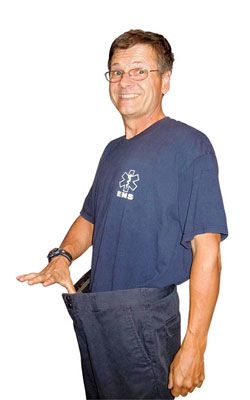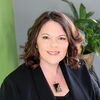Rockport EMT cuts 50 lbs. in workplace challenge
 photo/Courtesy North east Mobile health Services
photo/Courtesy North east Mobile health Services
In his career as a paramedic, Dennis Simmons has seen the toll an unhealthy lifestyle can take.
As Rockport division commander for North East Mobile Health Services, Simmons helps to treat patients suffering from obesity-related conditions like heart disease and diabetes, but found himself letting his own fitness slide amid the hurried lifestyle of a health care professional.
At his annual physical in December 2011, Simmons weighed in at his heaviest-ever, 200 pounds, and knew something needed to change. But, like so many of us, he couldn't muster the motivation to make the lifestyle changes necessary to address issues of weight, cholesterol and high blood pressure.
Help came less than a month later as North East Mobile Health Services — the largest ambulance service in the state with stations in Biddeford, Topsham, Dresden and Scarborough — launched the Healthy Start challenge, a company-wide initiative aimed at improving health and wellness across the 200-employee organization.
“It's about changing minor things over a long-term basis, not a quick fix,” says Maria Curran Russell, health and wellness coordinator for NEMHS who sees the program as an opportunity for the company to lead by example.
In all, 72 employees enrolled and formed three-person teams. The employees competed to see who could lose the most weight by embracing a healthier diet and incorporating exercise into their daily routines over a six-month period.
“We know that EMTs in general like to have that competitive edge; they seem to succeed with that and they like challenges,” says Russell.
Simmons rose to the challenge, winning the competition by losing 50 pounds over the six-month program and racking up impressive numbers on his health index (see “Before and after” box, previous page).
It was that competitiveness that incoming CEO Kevin McGinnis hoped to capitalize on when he launched the program soon after he started in his new role in January. “I think companies need to support wellness challenges from the top down, so it's great that we had the new CEO on board,” says Russell.
“A lot of health care systems and hospitals have wellness initiatives, but I think our company is taking a more drastic approach. We are the ones who are there in an emergency, so if we are not the example, who is?” says Russell.
As part of the Healthy Start program, employees received a monthly stipend toward a gym membership, activity-based incentive prizes like gift cards for rock climbing and other outdoor activities and $15 per monthly weigh-in. Simmons' winning team walked away with a $600 cash prize for their healthier habits.
The program has already helped NEMHS reduce its insurance costs and slash the number of work-related injuries, according to Russell. “Our average for workers' comp injuries used to be one per 14 days; now we are at day 59,” Russell said in late August.
The program would have likely netted lower health care costs for the company, but NEMHS recently switched to a private insurer and could not provide an estimate of cost-savings.
“Morale has improved greatly, that's been the biggest benefit,” says Russell. “[Employees] are not getting as tired, not getting sick or going to the doctor as often.”
Mainebiz chatted recently with the now-svelte Simmons. The following is an edited transcript.
Mainebiz: Have you always been an EMT?
Simmons: I've been in [emergency medical services] since 2000, but no, before that I was in the seafood business. I ran my own wholesale business in Maine for several years, but I got out of the fish business because it's hard to make a living at it, as evidenced by the lobster glut this year; there was not a lot of opportunity in it. I liked being an EMT — I'd been doing it as a volunteer since 2000 — and I enjoyed it, so I decided to do it full time in 2004.
Why did you decide to get involved in the Healthy Start challenge?
Well, they started the health challenge in January, but what happened to me was, in December, I had an annual physical and my weight was the heaviest I had ever been. My cholesterol was way high, my blood pressure was high and I knew I needed to do something. My doctor said that if I diet and exercise, most of those numbers would change on their own. It's hard to diet over the holidays, but in January they announced the [challenge] and I thought that was my chance right there.
What are some challenges you faced early on?
Just getting into a routine and getting that rhythm. It's hard to get into that mode of getting up at 4 a.m. or setting the time aside, but once you get into that rhythm, it's pretty easy to stick with it. Once you get into it and start to feel better and look better, it starts to become a lifestyle.
Were there any moments when you wanted to give up?
I would tend to hit plateaus where my weight wouldn't change for a week or two. Then you get discouraged and you think you need to do more, which is not really true — you can overdo, which can keep you from losing weight. I think everybody hits those plateaus. But that was the thing about the team approach — because we had all been through that, we could relate to [each other] and pass on tips like “try eating this” or “try working out in the morning rather than the evening.”
How important were other team members in helping you achieve your wellness goals?
I think Maria's idea of having teammates was key to the whole thing. Trying to diet on your own when others around you are eating makes it very difficult. When you have teammates to encourage you, it makes things a whole lot easier.
Did you find yourself using the subsidized gym membership?
I had never been in a gym in my life. I thought, 'Who wants to get all sweaty and work out every day?' But I was there three or four times a week. It's important to find something you enjoy doing because it's easier to stick with it.
Any new favorite workout routines?
I like using kettlebells more than other things you can do there; they seem more interesting. I think it's a great workout and if you get a good routine, it tends to work more of your body all at one time rather than going around to different machines, which I find boring. I live on a peninsula on a dead-end road that kind of circles to form a horseshoe that is three miles from end to end. Early in the morning as the sun comes up, I like to go for a jog along the road. That's what I do to vary my routine: I might go jog a day or two a week.
As someone who works in the health care industry, do you think it's important that you embody this concept of healthy living?
Sure. It's kind of hypocritical as a health care provider to not be healthy yourself, but I think a lot of us are. Not just in EMS, but health care in general.
Has your weight loss and overall improvements to your health made your job as an EMT easier?
I'm a little stronger now and absolutely you have more energy, no question.
Is being an EMT a very physically demanding occupation?
It depends on the shift. On the day shift, you are up and active and going quite a bit. But on the night shift it can just be sitting around for many hours at a time not doing anything; there can be substantial downtime. Even when we are busy, we get a lot of long-distance transports, so we might be in a truck for six to eight hours at a time.
What were some of the hardest habits to kick?
I think the difficult one was kicking the sweet foods, but I don't deprive myself of anything or completely stop eating anything I enjoy — I just don't eat a lot of it. People who tend to deprive themselves of the things they really enjoy tend to have the hardest time. If you don't satisfy those cravings, you tend to binge and that defeats the purpose. Usually Sundays are my days of not working out and I'll go have an ice cream or a cheeseburger, but during the rest of the week I stay away from that.
Was there any habit that was surprisingly easy to get over?
I think soda was the biggest thing. I used to drink a lot of it, but I had a soda this weekend and couldn't drink it; it was too sweet and just didn't taste good to me.
Do you have a new favorite healthy meal?
I probably eat a salad a least once a day now. I would never make one for myself before, but now I have [ingredients] on hand all the time. All I do for dressing is I put it on the side and dip my fork tines in it then put it in the salad. I grew my own garden this year so I would have my own fresh veggies, although my wife had a whole lot to do with that.
Speaking of your wife, how does she feel about the new, healthier you?
She told me I had to stop [losing weight]! Once you get going, it's kind of hard to stop, but you do get to a point where you start to look a little too thin. But she likes to go clothes shopping so she loves it — she gets to take me shopping all the time.
Have you found a fresh new style now that you are 6 inches slimmer?
(Laughing.) Yeah, I wear shorts more often than I ever use to, and T-shirts. I don't know if that's a new style, but I don't need to wear baggy clothes because they are baggy enough on their own now.
Do you think this sort of incentive-based wellness program should be widely used by companies?
I think this would work for any company no matter what industry they are in. I think it's the way for a lot of people to do it, because I know people who try to diet and exercise on their own and they can't do it, so having someone to help push and encourage you makes it a lot easier. It was to get us, as a group, healthier. And we saw a reflection in our overall health care costs as a company.
Are you going to keep at it now that the program is over? Will you be participating in the company fall wellness program?
I'm still going to keep going on my own now that I've gotten into the routine. I still get up at 4 a.m. most every morning and do my thing. This fall I'm going to form a little different team at the base [in Rockport]. We've got other employees who want to come in and do the same thing, and I think it's important that I set that example. I don't have that 50 pounds to lose now, but I can help keep them motivated. Plus it makes it easier for me to help keep the weight off.
Any future wellness goals you're hoping to hit?
I was looking to be down to 150 pounds and that is where I am at and where I am looking to stay.










Comments